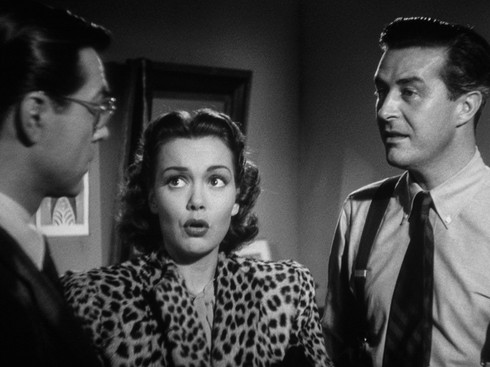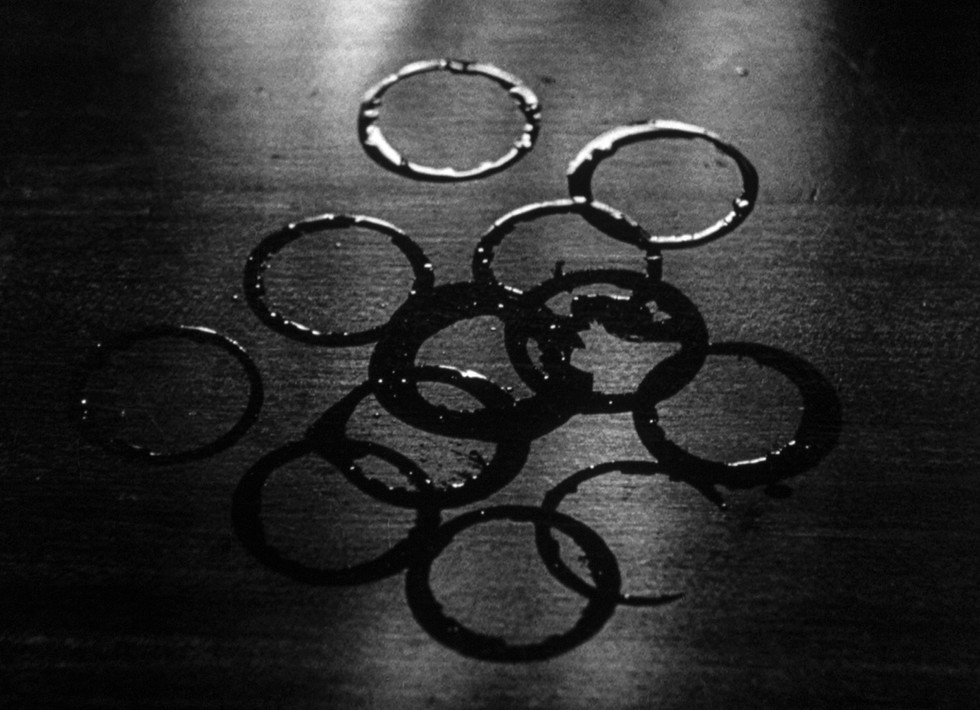“The Lost Weekend,” Billy Wilder’s sobering Oscar winner, gets terrific upgrade
- Peggy Earle
- Jan 20, 2021
- 4 min read
Updated: Jun 23, 2022
BLU-RAY REVIEW / FRAME SHOTS

Welsh actor Ray Milland won an Academy Award for Best Actor as alcoholic New York writer Don Birnam.
(Click an image to scroll the larger versions)
“THE LOST WEEKEND”
Blu-ray; 1945; Not Rated
Best extra: Commentary by film historian Joseph McBride
IF YOU’RE NOT depressed enough by the threats of the still-raging pandemic or the violent siege of our nation’s capital, “The Lost Weekend” might drag you to further depths. Conversely, it may soothe you with the knowledge that things could be worse. You could be a raging alcoholic and experiencing horrific DTs in a Bellevue Hospital drunk ward.
That’s what happens to Ray Milland in a scene from the dark Academy Award-winner of 1945, now out on Blu-ray thanks to Kino Lorber Studio Classics. Directed and co-written by Billy Wilder (“Sunset Boulevard,” “Double Indemnity” etc.), which was adapted from a best-selling novel by Charles Brackett (who co-wrote the screenplay), the film tells the story of Don Birnam, played by Milland in a breakthrough, Academy Award-winning performance. Known for clever, comedic timing, action-adventure and romance – Milland bested John Wayne in “Reap the Wild Wind” (1942), wrestled a giant octopus and gets the girl. His role in “The Lost Weekend” was a big departure.
Birnam is a New York writer suffering from writer’s block and an alcoholic whose addiction and lack of money drive him to desperation. The film opens with Birnam attempting to sneak a bottle of rye, his booze of choice, into his suitcase before going on a trip with his buttoned-down brother Wick (Phillip Terry). Birnam’s devoted girlfriend Helen (Jane Wyman) is there to see them off, but the plan is foiled when Wick finds the bottle and pours its contents into the sink. The trip is called off, and Birnam manages to convince Wick and Helen to go to a concert together, after which he heads to the neighborhood bar, where he cons the bartender (Howard Da Silva) out of a few shots.
(1) “The Lost Weekend” premiered November 1945; writer/director Billy Wilder won Oscars for directing and writing. (2) Don and his buttoned-down brother Wick (Phillip Terry) prepare for a weekend trip to the country. (3) Jane Wyman plays Don’s girlfriend Helen. (4) Wick discovers a bottle of rye outside of the window.
While he’s there, Birnam describes the plot of his unwritten book, which is actually his own story about his love for Helen and the ways he sabotages their relationship, thanks to his addiction. When his money is gone, Birnam descends lower and lower, until he lands in Bellevue among other violently detoxing patients. The nurse on duty in the ward is portrayed by Frank Faylen – a role totally opposite to Ernie, the friendly taxi driver he played in “It’s a Wonderful Life” – who explains the grim realities of the hospital experience to Birnam.
While the film ends on a hopeful, happy note, there are subtle hints that Birnam will relapse. In addition to four Oscars – Best Picture, Best Director, Best Actor, and Screenplay – the film also won the Grand Prix at Cannes, where Milland again won Best Actor.
VIDEO/AUDIO
The Blu-ray, sourced from a recent 4K master (1.37:1 aspect ratio) from Universal Pictures, looks very good, with plenty of natural film grain and close-up detail. Contrast looks great, with some nice velvety blacks and shades of gray. The single audio track also excels, with clear dialogue and an unusual score by Miklòs Ròzsa (“Ben-Hur,” 1959; “El Cid,” 1961) providing just the right forbidding tone.
EXTRAS
A 1946 radio adaptation is provided featuring Milland, Wyman and Faylen; an episode of the web series “Trailers from Hell,” with director Mark Pellington; and the theatrical trailer.
The commentary with Joseph McBride is a mixed bag of interesting facts and trivia about the film, with a bit too much plot description, self-revelation and discussions about alcoholism. McBride notes that “The Lost Weekend” was a groundbreaking film because the usual depictions of drunks in movies up until then were figures of fun, like the seemingly always tipsy W.C. Fields. Wilder wanted to show what alcoholism is really like.
(1&2) Don steals money intended for his maid and begins an afternoon of drinking at Nat's Bar on 3rd Avenue. He tells Nat he must leave by 5:45 p.m. to catch the train. (3-5) After a dozen drinks, Don is late and hides behind the stairs as Wick tells Helen goodbye.
Like Wilder’s “The Apartment,” another Best Picture winner, it's a story of ordinary New Yorkers, McBride says. It was shot on location, which was rare for a Hollywood film in those days. Another departure from typical studio fare at the time, in which there was a “tendency to sugar-coat social flaws,” Wilder pulls no punches about the degradation and horrors associated with severe dipsomania. Admirably, however, notes McBride, Wilder does not condemn his protagonist, such as in a scene in which Helen explains that alcoholism is an illness.
McBride discusses Brackett’s novel quite a bit, which did not have the happy ending of the film. In the book, Birnam was a repressed homosexual, which would never have flown in a 1945 Hollywood movie. McBride says Wilder originally wanted to cast Cary Grant or José Ferrer as Birnam, a role which he felt sure would win an Oscar, but then settled on Welsh actor, Milland. McBride notes that Ròzsa, who scored five of Wilder’s films, makes much use of a theremin in “Lost Weekend.” The ominous, other-worldly sound of that electronic instrument was usually found in science fiction films including “Rocketship X-M” (1950) and “The Day the Earth Stood Still” (1951). Ròzsa also used it in Hitchcock’s “Spellbound” (1945).
— Peggy Earle
(1-3) Don is desperate for another drink and frantically searches his apartment for the bottle of rye he'd hidden. (4) During a flashback scene, Don is accused of stealing money from a woman’s purse at a restaurant. (5) Don is in Bellevue’s drunk ward where the nurse on duty (Frank Faylen) tells him what to expect.
(1) All exteriors were filmed in New York City, rare for a Hollywood film in those days. (2&3) Helen waits for Don to come home. She hopes to save him, and encourages Don to write his story.



































Comentários